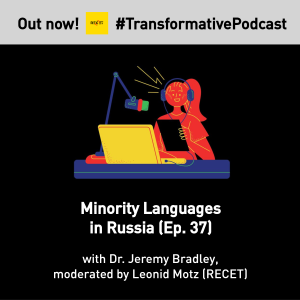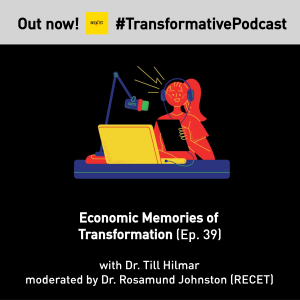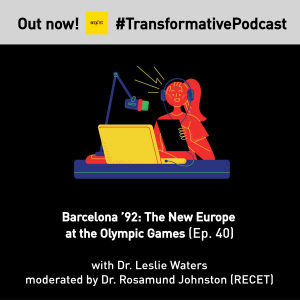
9.2K
Downloads
75
Episodes
Welcome to the Transformative Podcast, which takes the year 1989 as a starting point to think about social, economic, and cultural transformations on a European and global scale. This podcast is produced by the Research Center for the History of Transformations (RECET) and its managing director Irena Remestwenski. Our patron is Philipp Ther, and we could not do it without Leonid Motz, Jannis Panagiotidis, Rosamund Johnston, Sheng Peng, and Jelena Dureinovic.
Episodes

Wednesday Feb 01, 2023
Churches in Ukraine (Yuliya Yurchuk)
Wednesday Feb 01, 2023
Wednesday Feb 01, 2023

Wednesday Feb 22, 2023
Sexologists in Socialist Czechoslovakia (Kateřina Lišková)
Wednesday Feb 22, 2023
Wednesday Feb 22, 2023

Thursday Mar 16, 2023
Past and Present: Migration, Crisis and Public History in Poland (Dariusz Stola)
Thursday Mar 16, 2023
Thursday Mar 16, 2023

Wednesday Apr 19, 2023
Banal Nationalism in Soviet Ukraine (Fabian Baumann)
Wednesday Apr 19, 2023
Wednesday Apr 19, 2023
In this episode, Fabian Baumann (RECET) talks to Irena Remestwenski (also RECET) about ‘banal’ forms of nationalism and visual representations of Ukrainianness employed by postwar Soviet propaganda, as well as the role of the economy in constructing Soviet Ukrainian identity in late socialism. Baumann sheds light on national narratives that were permissible under socialism and those that were out of bounds and also attempts to contribute to the pre-history of the 1991 referendum, in which Ukrainians overwhelmingly chose national independence.
Dr. des. Fabian Baumann is a visiting postdoctoral researcher at RECET and holder of a Postdoc.Mobility grant from the Swiss National Science Foundation. Following studies in Geneva, Saint Petersburg, and Oxford, he completed his PhD in history at the University of Basel in 2020. From 2021 to 2022 he was a visiting postdoctoral fellow at the University of Chicago. His first book Dynasty Divided: A Family History of Russian and Ukrainian Nationalism will be published by NIU Press/Cornell University Press in August 2023.

Wednesday May 10, 2023
Why Studying Migration Matters (Jannis Panagiotidis)
Wednesday May 10, 2023
Wednesday May 10, 2023
In this thought-provoking conversation, Thuc Linh Nguyen Vu (RECET) and Jannis Panagiotidis (RECET) dive deep into the question of why migration — as a scholarly field and an intrinsic aspect of contemporary world — deeply matters to historians and policy makers. Panagiotidis and Nguyen Vu also explore new research avenues such as the examination of precarious Whiteness of Eastern Europeans and the importance of migrant perspectives in the debates on migration.
Jannis Panagiotidis is the Scientific Director of the Research Center for the History of Transformation. From 2014 until 2020, he was Junior Professor for Migration and Integration of Germans from Russia at the Osnabrück University Institute for Migration Research and Intercultural Studies (IMIS). At RECET, he works on a project investigating liberal global orders and freedom of movement and guides a research project on post-Soviet immigrant communities in Germany. He wrote the books: The Unchosen Ones. Diaspora, Nation, and Migration in Israel and Germany (Indiana UP, 2019) and Postsowjetische Migration in Deutschland: Eine Einführung (Beltz/Juventa, 2021).

Wednesday May 31, 2023
Transformative Power Of Utopias (Kristen Ghodsee)
Wednesday May 31, 2023
Wednesday May 31, 2023

Wednesday Jun 21, 2023
Minority Languages in Russia (Jeremy Bradley)
Wednesday Jun 21, 2023
Wednesday Jun 21, 2023
How can the challenges faced by minoritized languages of the Russian Federation and their speaker communities be understood through the lens of Russia’s colonial expansion? In this newest episode, Leonid Motz (RECET) talks to Dr. Jeremy Bradley (University of Vienna), exploring the historical and social transformation of minority language use and study in Russia and the threats of Russification and assimilation. How do communities overcome the considerable obstacles posed by the present-day Russian state to maintain and revitalize their languages successfully?
Jeremy Bradley is a postdoctoral researcher at the University of Vienna’s Department of Finno-Ugrian Studies. His research interests include linguistic convergence in the Volga-Kama Region, corpus building, and the creation of didactic and reference materials for low-resource languages.

Wednesday Jul 12, 2023
Wednesday Jul 12, 2023

Wednesday Aug 02, 2023
Economic Memories of Transformation (Till Hilmar)
Wednesday Aug 02, 2023
Wednesday Aug 02, 2023
Economic thinking is far from the preserve of central bankers and policy wonks. In dozens of interviews in the Czech Republic and the former East Germany, sociologist Till Hilmar asked healthcare workers and engineers about their experiences of the transformation period to understand how economic shifts are remembered, and what memories can tell us about processes of economic change. As a result, he gained a picture of transformation “from below.” In this episode of the Transformative Podcast, Hilmar tells Rosamund Johnston why people’s views of the 1990s still matter now. He explains how his work sheds light on how people respond to crisis, both in the short and long term.
Till Hilmar is a postdoctoral researcher in the University of Vienna’s Department of Sociology. He is the author of Deserved. Economic Memories after the Fall of the Iron Curtain, which was recently published by Columbia University Press. He received his PhD from Yale University in 2019. His research has been published in numerous outlets, including the European Journal of Sociology, East European Politics and Societies, and the Journal of Contemporary European Studies.

Wednesday Oct 04, 2023
Barcelona ’92: The New Europe at the Olympic Games (Leslie Waters)
Wednesday Oct 04, 2023
Wednesday Oct 04, 2023
Does international sport foster capitalist economics and political liberalism among participating states? In this episode of the Transformative Podcast, Leslie Waters (University of Texas, El Paso) tells Rosamund Johnston (RECET) about the Olympics’ “mixed” record in this regard.
Barcelona 1992 introduced to global audiences a host of new European states. But the games also showcased the enduring legacy of state socialist sporting prowess. Lustration tore through some national Olympic committees while, in others, post-socialist elites used the institutions of international sport to rebrand as political liberals. Ultimately, Waters argues, sportswashing is not new, and was undertaken here by hosts Spain alongside countries with a not-so-distant socialist past.
Leslie Waters is Assistant Professor of History at the University of Texas, El Paso. In addition, she is the managing editor of Hungarian Studies Review. Her first book, Borders on the Move: Territorial Change and Ethnic Cleansing in the Hungarian-Slovak Borderlands was published in 2020 by University of Rochester Press.
